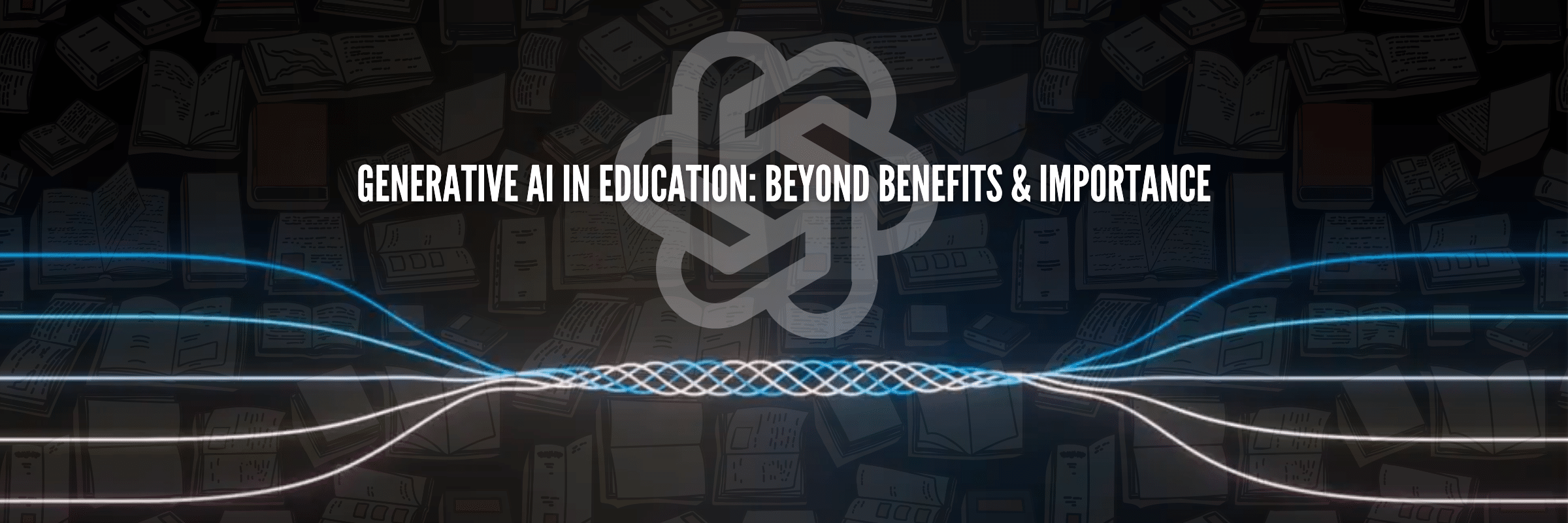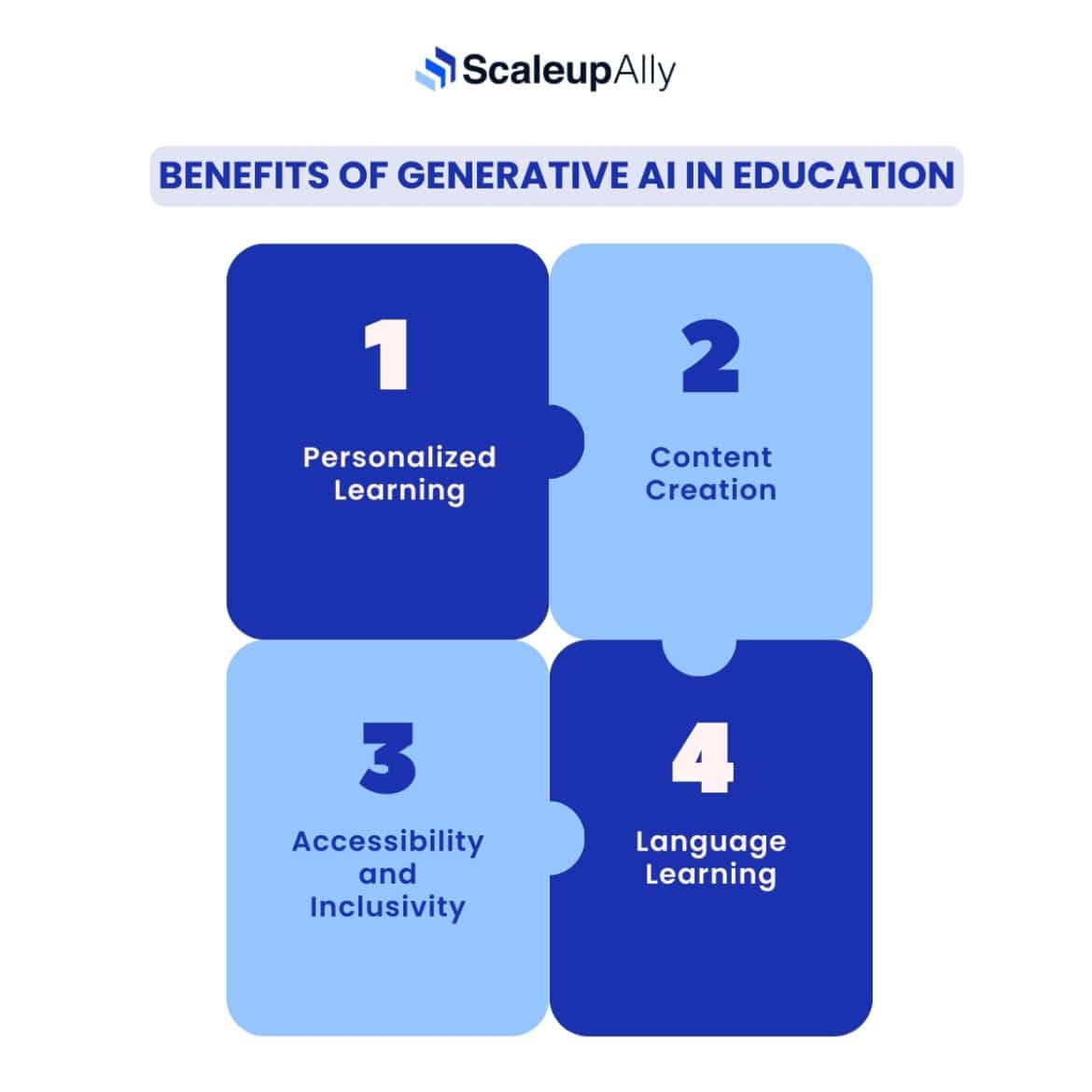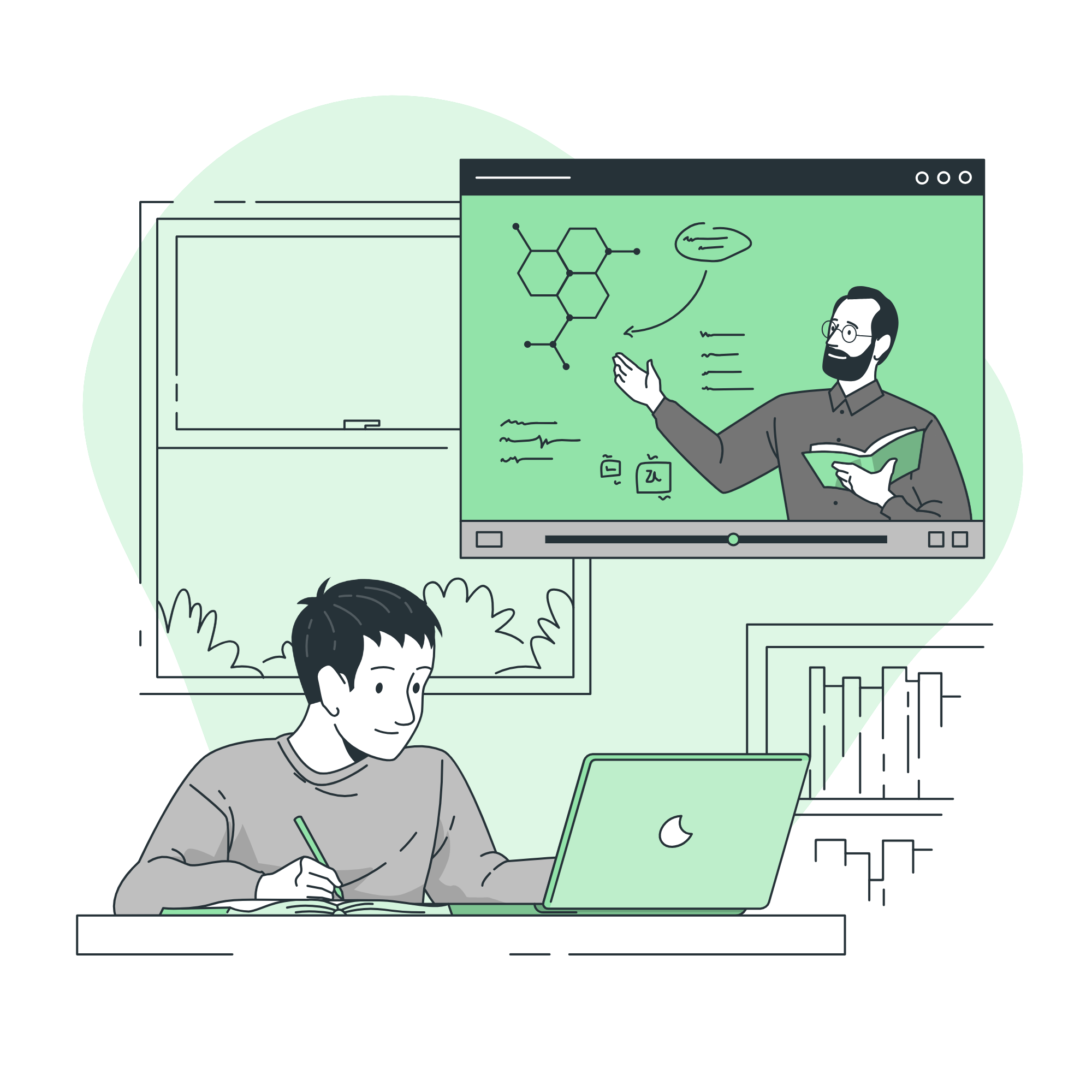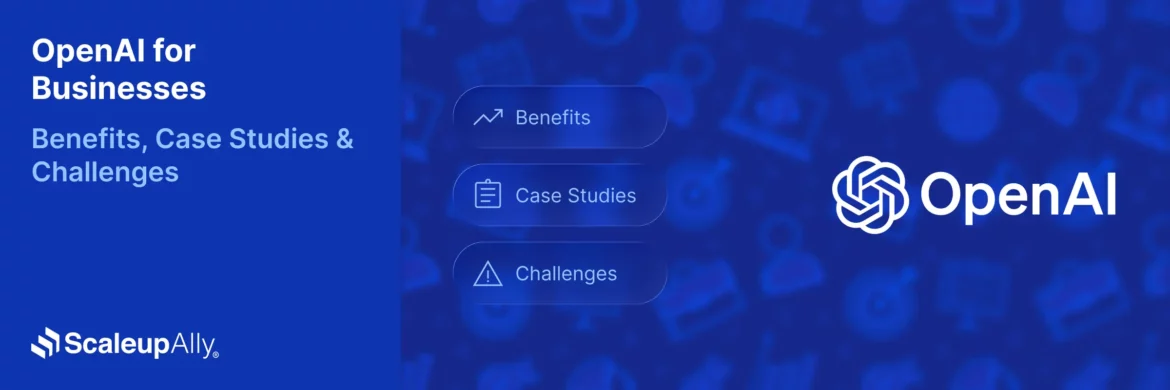
Generative AI in Education: Beyond Benefits & Importance
Manu Jain | June 29, 2024 , 14 min read
Table Of Content
Imagine a classroom where every student has a personalized tutor, one that adjusts to their learning pace, understands their strengths and weaknesses, and can even create custom learning materials.
This isn’t science fiction – it’s the potential of Generative AI in education.
Traditional education often relies on a one-size-fits-all approach, leaving students who learn differently behind. Generative AI, however, has the power to transform this by creating dynamic and personalized learning experiences.
Let’s explore how AI can move beyond the well-known benefits of efficiency and delve deeper into its potential to revolutionize the very core of how we educate.
Key Takeaways
- Generative AI empowers personalized learning by tailoring content, pace, and feedback to each student’s unique needs, enhancing outcomes.
- AI-driven tools improve accessibility and inclusivity, providing support for students with disabilities or learning challenges in classrooms.
- By automating administrative and repetitive tasks, generative AI allows teachers to focus on instruction, mentoring, and student engagement.
- Ethical implementation is crucial: protect student data, monitor algorithmic bias, and ensure AI complements rather than replaces educators.
- Equitable access to AI-powered education ensures all learners benefit from immersive experiences, simulations, and adaptive learning systems.
What is Generative AI in Education?
- What is Generative AI in Education?
- What is the Importance of Generative AI in Education?
- What are the Benefits of Generative AI in Education?
- Ethical Considerations While Implementing Gen AI in Education
- The Future of Education with Generative AI
- Conclusion
- Frequently Asked Questions (FAQs)
- Similar Articles Around Generative AI
Generative AI in education refers to the application of artificial intelligence (AI) that can create new educational content and experiences. Unlike traditional AI used for tasks like grading or providing basic feedback, generative AI goes a step further by dynamically generating things like Personalized learning materials and Interactive simulations.
What is the Importance of Generative AI in Education?
Gennerative AI has the potential to revolutionize education by making it more personalized, engaging, and effective for all learners.
Let us explore some of the reasons why implemention gen AI is important for advancement of the education industry:
- Personalized Learning: Generative AI facilitates a transition from the traditional one-size-fits-all education model to a more individualized approach. AI can greatly enhance student engagement and learning outcomes by tailoring content, adjusting the pace of instruction, and providing personalized feedback based on each student’s unique needs and learning style. This customization ensures that every student receives the support they need to succeed, fostering a more effective and enjoyable learning experience.
- Enhanced Accessibility: AI-powered educational tools play a crucial role in supporting students with disabilities, thereby creating a more inclusive learning environment. These tools can offer various forms of assistance, such as speech-to-text capabilities, visual aids, and personalized learning resources, which help bridge the gap for students who may otherwise face challenges in traditional educational settings. By generating customized content and learning pathways, these AI systems can cater to the unique needs of each student, making learning more accessible and ensuring that all students have the opportunity to reach their full potential.
- Teacher Empowerment: Generative AI can significantly reduce the administrative burden on teachers by automating routine tasks such as grading, attendance tracking, and content creation. This automation allows teachers to focus more on personalized instruction and direct interaction with students, enhancing the overall teaching and learning experience. For instance, one of the many examples of Generative AI in education includes the use of AI to generate customized lesson plans tailored to each student’s learning pace and style. With more time to devote to each student, teachers can better address individual learning needs, foster deeper understanding, and build stronger relationships with their students.
- Engaging and Immersive Experiences: AI has the capability to create highly engaging and interactive educational experiences, such as virtual simulations, interactive labs, and immersive learning environments. These tools bring abstract concepts to life, making learning more enjoyable and effective. By providing hands-on, experiential learning opportunities, AI helps students to better understand complex subjects, retain information longer, and apply their knowledge in practical situations.
- Evolving Curriculum: Generative AI can analyze vast amounts of educational data to identify knowledge gaps, track student progress, and detect emerging trends in education. This analysis informs the development of a more dynamic and relevant curriculum that evolves to meet the changing needs of students and the demands of the modern world. By continuously updating educational content and strategies, AI ensures that students are equipped with the most current knowledge and skills, preparing them for future success in a rapidly evolving landscape.
What are the Benefits of Generative AI in Education?

Generative AI offers a multitude of benefits that can transform the educational landscape. Here are some key areas where it shines:
1. Personalized Learning
Generative AI can tailor the learning experience to each student’s needs. Imagine textbooks that adjust to their understanding, practice problems that target weaknesses, and AI tutors that provide personalized feedback – all within a single platform. This caters to various learning styles and paces, ensuring no student gets left behind.
2. Content Creation
Generative AI can alleviate the burden on educators by creating a vast amount of educational content. This includes interactive simulations, quizzes, and even full-fledged lectures that can explain complex topics in an engaging way. Teachers can then focus on curating the best content and using their expertise to guide discussions and answer questions.
3. Accessibility and Inclusivity
Generative AI can create a more inclusive learning environment. For instance, AI-powered tools can generate text-to-speech or speech-to-text options, helping students with visual or auditory impairments. Additionally, AI tutors can provide customized support for students with learning disabilities, ensuring everyone has an equal opportunity to succeed.
4. Language Learning
Generative AI can revolutionize language learning by providing immersive and interactive experiences. Imagine practicing conversations with a virtual AI partner or receiving real-time feedback on pronunciation and grammar. This personalized approach can significantly improve fluency and comprehension.
Ready to Embrace AI in Education?
Understand the ethical considerations and future outlook of AI in learning.

Ethical Considerations While Implementing Gen AI in Education
While generative AI offers a treasure trove of potential for education, it’s crucial to address some ethical considerations before diving headfirst.
Here are some key ethical considerations to keep in mind:
1. Teacher Training
Educators need proper training to effectively integrate generative AI tools into their classrooms. This includes a comprehensive understanding of the capabilities and limitations of AI, ensuring that its use is both ethical and complementary to human interaction in the learning process.
Generative AI in higher education, for instance, presents unique opportunities and challenges. Instructors must learn how to leverage these tools to enhance the educational experience without allowing the technology to overshadow the critical role of human guidance and interaction.
Proper training programs should focus on equipping educators with the knowledge and skills needed to balance AI integration thoughtfully and responsibly.
2. Data Privacy
Generative AI relies heavily on student data to personalize learning. To harness the benefits of generative AI in education, stringent data security measures are essential to protect student privacy and ensure data is used responsibly and ethically.
These measures help safeguard sensitive information, preventing unauthorized access and potential misuse. Additionally, transparency about data collection and usage is vital for building trust with students and parents.
By clearly communicating how data is gathered, stored, and utilized, educational institutions can foster a sense of security and confidence in the technology.
3. Over-reliance on AI
Generative AI shouldn’t replace the irreplaceable role of human teachers. While AI should be a powerful tool to enhance learning, critical thinking, creativity, and social-emotional development still require a strong human connection in the classroom.
Generative AI use cases in education can include personalized learning paths, automated grading, and virtual tutoring.
However, these technologies should complement, not replace, the unique contributions of educators who foster essential skills and nurture the emotional well-being of students.
4. Algorithmic Bias
AI systems can perpetuate biases present in the data they’re trained on, leading to unfair or discriminatory outcomes for certain student groups.
For instance, if the training data reflects historical inequities, the AI might unintentionally reinforce those patterns, disadvantaging underrepresented or marginalized students. This is particularly concerning when implementing generative AI in education.
Examples of this technology include automated essay grading, personalized learning plans, and virtual tutoring systems, all of which have the potential to significantly influence educational experiences and outcomes.
To mitigate these risks and ensure fairness in AI-powered education, it’s crucial to carefully select and preprocess the training data to eliminate as much bias as possible.
Ongoing monitoring and evaluation of the AI systems are equally important, allowing educators and developers to identify and address any emerging biases.
By implementing these practices, we can harness the benefits of generative AI in education while promoting equity and inclusion for all students.
5. Accessibility and Equity
Not all students may have equal access to technology or the internet. This could exacerbate educational inequalities if generative AI tools become the norm.
Ensuring equitable access to technology and fostering digital literacy will be essential to ensure AI benefits all learners. As we look toward the future of generative AI in education, it is crucial to address these disparities.
By openly discussing these ethical considerations and developing clear guidelines, we can harness the power of generative AI to create a more personalized, engaging, and equitable learning experience for every student.
The Future of Education with Generative AI
The future of generative AI in education is brimming with possibilities. Here’s a glimpse of what’s on the horizon:
1. AI-powered VR Classrooms
Imagine stepping into immersive virtual reality experiences that transport students to the heart of historical events, allowing them to witness pivotal moments firsthand. Picture exploring the depths of the ocean, swimming alongside majestic marine life, or even dissecting a virtual frog with lifelike accuracy.
Generative AI can power these simulations, creating dynamic, interactive environments that foster deeper understanding and a profound love for learning.
With this technology, education transcends the confines of traditional classrooms, offering limitless possibilities for exploration and discovery.
2. Real-time Performance Feedback
AI tutors leverage advanced algorithms to analyze student work in real-time. This capability enables them to provide immediate and personalized feedback that extends beyond simply assigning a grade.
By offering detailed insights into the strengths and weaknesses of student responses, AI tutors facilitate course correction and promote deeper understanding before students progress further.
A plagiarism checker also plays a vital role in ensuring academic integrity by automatically detecting copied content. This not only helps maintain originality but also teaches students the value of producing authentic work, fostering better writing habits and ethical learning practices.
This real-time feedback loop enhances the learning process, helping students grasp concepts more effectively and empowering them to achieve their academic goals.
3. Adaptive Learning Systems
Generative AI possesses the remarkable ability to construct dynamic learning paths tailored to each student’s progress. By leveraging this technology, educational platforms can effectively address individual knowledge gaps and provide targeted challenges.
This personalized approach ensures that students are continuously engaged at an appropriate level, fostering a learning environment where they can progress without feeling overwhelmed or stuck.
4. Automated Grading and Report Generation
AI has the capability to efficiently manage laborious tasks, such as grading essays and producing comprehensive reports on student progress. By automating these tasks, AI liberates teachers’ time, enabling them to focus on providing tailored instruction and engaging more deeply with students.
5. AI-powered Language Learning
Imagine having a virtual conversation partner who adjusts to your language proficiency level and offers instant feedback on pronunciation and grammar. With generative AI, language learning can become more personalized, enhancing its effectiveness and engagement.
Conclusion
The future of education with generative AI is indeed exciting and full of promise. It has the potential to revolutionize the way we learn, making education more personalized, engaging, and effective. However, it’s crucial to approach this advancement with caution and responsibility.
AI is a tool, and like any tool, its impact depends on how it is used. It’s essential to consider the ethical implications of AI in education, such as data privacy, algorithmic bias, and the potential for replacing human educators. Ensuring equitable access to AI-powered education is also paramount, as not all students may have the same resources or opportunities to benefit from these technologies.
Despite these challenges, the future envisioned with generative AI in education is incredibly promising. Imagine classrooms where AI assists teachers by providing personalized learning experiences for each student, catering to their unique needs and learning styles. This could lead to a more inclusive and engaging learning environment, where every student has the opportunity to thrive.
Additionally, AI can help educators streamline administrative tasks, allowing them to focus more on teaching and mentoring students. This collaborative approach, where humans and AI work together as allies, has the potential to significantly enhance the quality of education and foster a lifelong love of learning in students.
In conclusion, the future of education with generative AI holds immense potential. By approaching its development and implementation with care, consideration, and a commitment to equity, we can create a future where education is more personalized, inclusive, and inspiring for all.
Partner with ScaleupAlly to harness the power of generative AI services and solutions in education, backed by our expert Education IT services.
Frequently Asked Questions (FAQs)
Q: How can Gen AI be used in education?
Generative AI can be used in education industry to personalize learning, create educational content, provide real-time tutoring, automate assessments, and support administrative tasks.
Q: How will generative AI change higher education?
Generative AI will enhance personalized learning, streamline administrative processes, and offer innovative ways to engage students through simulations and virtual labs.
Q: Will Gen AI replace teachers in the classroom?
No, generative AI will not replace teachers but will assist them by automating routine tasks and providing personalized support, allowing teachers to focus on more critical aspects of education.
Q: Why is generative AI good for students?
Generative AI is good for students as it offers personalized learning experiences, instant feedback, and additional support, helping students learn more effectively and efficiently.
Similar Articles Around Generative AI
Related Blogs

OpenAI for Businesses [Benefits, Use Cases & Challenges]
Discover the benefits of OpenAI for businesses. From reducing costs to scaling operations and enriching customer experiences. Real-world use cases included.
ScaleupAlly Team
Dec 16 ,
11 min read

Best 11 Agentic AI Tools in UAE: Accelerating Digital Transformation
Discover the top 11 agentic AI tools in UAE for 2025. Explore features, benefits, and tips to choose the right AI tool for your business growth.
Manu Jain
Nov 6 ,
9 min read

How to Choose an AI Development Company in Dubai: A Complete Guide
Find out how to choose the right AI development company in Dubai. Learn key factors, local considerations, and tips to select the best partner.
Manu Jain
Nov 6 ,
9 min read


